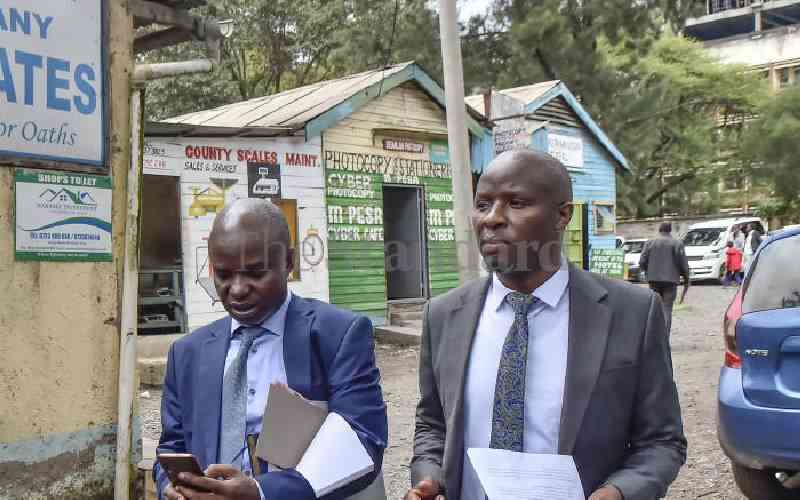A proposal to reduce building permit fees, if passed, will go a long way in reducing construction costs in Nairobi.
The Nairobi City County Finance Bill 2015 proposes to slash permit costs to 0.5 per cent of the total construction cost, down from the current rate of between one and 1.5 per cent.
The proposed flat rate is a departure from the current one, which is based on the size of the building.
The reduction portends reduced construction costs running into thousands or millions of shillings – depending on the size of the building.
For instance, a person constructing homes in Nairobi satellite towns like Kitengela at Sh5 million shall pay Sh25,000 for permits down from Sh75,000.
Hidden costs
Private developers spend money on assorted hidden costs even before they start to dig foundations of their buildings.
For instance, the National Construction Authority (NCA) requires payment of a levy imposed at 0.5 per cent of the value of any building whose value exceeds Sh5 million.
Therefore, investors who want to construct a building whose value is Sh10 million will pay Sh50,000 as construction levy.
Other regulatory fees that developers contend with include payments to the National Environment Management Authority (Nema) and the Mining ministry.
Nema imposes a minimum charge of Sh10,000 or 0.1 per cent of project cost for environmental impact assessment. The Mining ministry started collecting a two per cent royalty on construction materials; increasing the cost of quarry stones, concrete blocks, hardcore, ballast and sand.
Back to the Finance Bill, the proposed law comes hot on the heels of a request by acting Lands and Housing Cabinet Secretary Fred Matiang’i for authorities to reduce fees charged on real estate development to boost investment in the lucrative sector.
Over the past few years, developers have argued that high permit and other fees contribute towards the acute residential housing shortage.
According to records at City Hall, the increase has been reflected in the county’s revenue collection. It collected Sh1.3 billion in the fiscal year ending June 2015 up from Sh840 million the previous year.
Records show that majority of construction happens in Nairobi, which recorded 78 per cent of registered projects in the country in 2013.
Stay informed. Subscribe to our newsletter
City Hall also approved building plans valued at a whopping Sh205billion last year, up from Sh190billion in 2013.
Fire compliance
The proposed bill also wants Nairobi-based businesses to pay an annual charge for a fire compliance certificate according to the size and nature of a business.
For instance, owners of buildings of up to four floors; premises storing dangerous inflammable materials; medium-sized institutions including industries, banks, hospitals, schools, law firms and churches will part with Sh12,000 per year.
Large institutions including banks, industries, buildings of 10 floors and above, learning institutions, hospitals, hostels, hotels and churches will pay Sh25,000.
To encourage the real estate sector, the national and county government should seek ways of reducing costs.
A recent World Bank report - Doing Business 2014 - shows that doing business in Kenya has become more difficult.
Kenya is ranked 129th out of 189 countries in the 2014 report compared with a ranking of 121st out of 185 in 2013.
It takes 12 more days for businesses to get electricity, and the recovery rate (cents on the dollar) when dealing with resolving insolvency has fallen by 4.7 cents to 24.7 cents.
 The Standard Group Plc is a
multi-media organization with investments in media platforms spanning newspaper
print operations, television, radio broadcasting, digital and online services. The
Standard Group is recognized as a leading multi-media house in Kenya with a key
influence in matters of national and international interest.
The Standard Group Plc is a
multi-media organization with investments in media platforms spanning newspaper
print operations, television, radio broadcasting, digital and online services. The
Standard Group is recognized as a leading multi-media house in Kenya with a key
influence in matters of national and international interest.
 The Standard Group Plc is a
multi-media organization with investments in media platforms spanning newspaper
print operations, television, radio broadcasting, digital and online services. The
Standard Group is recognized as a leading multi-media house in Kenya with a key
influence in matters of national and international interest.
The Standard Group Plc is a
multi-media organization with investments in media platforms spanning newspaper
print operations, television, radio broadcasting, digital and online services. The
Standard Group is recognized as a leading multi-media house in Kenya with a key
influence in matters of national and international interest.






